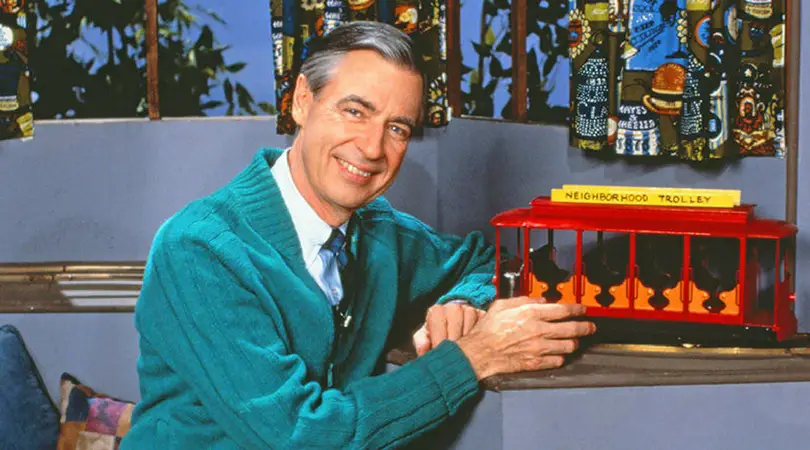2018 marks 50 years since the debut of “Mister Rogers’ Neighborhood.” Created and hosted by Fred Rogers, the children’s TV show launched in 1968 and ran for nearly 33 years.
The show’s message of love and acceptance shaped whole generations of children — around 8 percent of families with TVs watched the show at its peak.
Alongside the anniversary has come a wave of projects memorializing Mister Rogers. The USPS has released a set of stamps in his honor. A documentary titled “Won’t You Be My Neighbor?” will be released this summer, and a film staring Tom Hanks is in the works.
Amid all the buzz surrounding Mister Rogers, it’s easy to forget why he became such a legend in the first place. Here are a few reasons to remember.
1. He didn’t shy away from difficult conversations
Mister Rogers didn’t think about working in television until after he’d graduated college. He hadn’t watched a single show until he came back to his parents’ house the summer after his senior year, when they had just bought their first TV.
His first encounter left him both inspired and disheartened. He didn’t like what he saw — the pie throwing and slapstick struck him as “such demeaning behavior” — but he saw promise in the medium, one that he was eager to explore.
Part of this promise was the ability to teach children about the world and to guide them through their fears. Sometimes he dealt with the small fears, those only children would understand, like the fear of slipping down the bathtub drain.
Other times he talked about the big things which scared everyone, like when he explained divorce as something that happened when “some people get married and after a while, they’re so unhappy with each other that they don’t want to be married anymore.”
No matter the subject of conversation, he always provided gentle reassurance and a conviction that everything was going to be ok. He did this job so well he was often called upon in times of crisis to talk children through the disturbing events they were seeing elsewhere on television, such as the assassination of Robert Kennedy and the 9/11 terrorist attacks.
2. He paid attention to the details
Mister Rogers took his duties as America’s favorite neighbor very seriously. He took on many roles to make sure everything ran the way he wanted, producing and hosting the show as well as voicing many of the puppets and writing almost all of the music.
He also closely regulated what was said on screen, preferring scripted dialogue to ad-libs; he believed that children deserved something that was carefully thought out.
This attention to detail went all the way down to the small things he did every episode and made the Neighborhood more welcoming. At the opening of every episode, he walked onto the set in business clothes which he exchanged for a cardigan and sneakers.
The idea was to present himself as a kind of father figure, coming home from work and becoming more casual for his time with his television neighbor. Another thing he would always make sure to do was to feed his fish and to announce when he was doing it.
He’d always feed the fish on screen, but he started consistently announcing it after receiving a letter from a blind fan who grew worried about the fish when he didn’t say he’d fed them.
3. He made a difference off the screen
Mister Rogers wasn’t just obsessed with the way his show ran on the stage. He was also invested in making sure that the world of television worked out behind the camera.
At the beginning of his career, found success in the business when he learned that his hometown of Pittsburgh was launching the first public television station, WQED. He jumped at the opportunity to work there, seeing it as a way of creating the kind of television he’d always envisioned.
His support for public television continued throughout his life. In 1969, he went before a U.S. Senate subcommittee, which was meeting to decide whether to impose budget cuts on public television.
He defended what he did and the ways in which he did it, saying “This is what I give. I give an expression of care every day to each child, to help him realize that he is unique,” before singing one of the songs from his show.
His defense of public television was successful, and his speech was seen as a watershed in television history. He went on to testify again in 1984, defending new technology which allowed audiences to tape his shows and save them for later viewing.
He was also personally committed to a number of causes, from racial diversity to pacifism, and was unafraid to use his show as an agent of change.
4. He cared for everyone
Before Mister Rogers became a children’s TV personality, he had plans of becoming a minister in the Presbyterian Church. Though his life seemed to take an entirely different path, he continued his studies toward that end, and earned a divinity degree in 1962, just before the launch of “Mr. Rogers’ Neighborhood.”
He was ordained by the Presbyterian Church, but instead of being given a conventional means of acting as a minister, the church charged him with continuing to act out his faith through television.
His faith impacted many areas of Mister Rogers’ life, particularly his work in television. As he put it, “I just thought, wouldn’t it be wonderful if we could use this marvelous gift called television to broadcast grace to the entire world?” He tried to get across a message of grace and love with every episode, and along with, it a message of universal acceptance and compassion.
His sense of compassion, more than anything, is why people still remember Mister Rogers today. He cared for people, not with the fake niceness of a television personality, but from his deep-seated beliefs. And, as he would always remind his viewers, he liked them “just the way you are.”

















